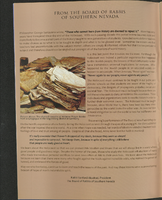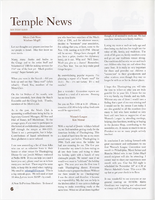Search the Special Collections and Archives Portal
Search Results

Program, The Memory Book accompanying The Diary of Anne Frank premiere performance, February 2009
Date
Archival Collection
Description
This program accompanied the performance of the Broadway adaptation of the Diary of Anne Frank by the Nevada Conservatory Theatre. The program was produced by the Jewish Family Service Agency. It includes biographies of survivors living in Southern Nevada and an educational guide.
Text

Interview with Patrick Rowe, November 5, 2004
Date
Archival Collection
Description
Text

Interview with Harold David Cunningham, March 11, 2004
Date
Archival Collection
Description
Text

Denise Lutey oral history interview: transcript
Date
Archival Collection
Description
Oral history interview with Denise Lutey conducted by Barbara Tabach on February 27, 2018 for the Remembering 1 October Oral History Project. In this interview, University of Las Vegas, Nevada (UNLV) campus officer Denise Lutey gives an account on the night of the October 1, 2017 mass shooting in Las Vegas, Nevada. She discusses the campus security measures taken at UNLV in order to keep the campus secure and create a safe space for any survivors. She mentions the people who were involved in providing safety and resources for the survivors, including the officers and student workers. Officer Lutey also discusses the general campus response as well as the various resources offered to citizens to help them be prepared for an emergency situation, such as the Active Shooter Training provided on campus.
Text

Brittany Castrejon oral history interview: transcript
Date
Archival Collection
Description
Oral history interview with Brittany Castrejon conducted by Claytee D. White and Barbara Tabach on November 9, 2017 for the Remembering 1 October Oral History Project. In this interview, Brittany Castrejon details her experiences during the evening of the 2017 mass shooting in Las Vegas, Nevada. She describes the Route 91 Harvest Festival set-up and details the events of that night, which she experienced alongside her 14-year-old cousin and a few friends. Castrejon tells her story of trying to find safety from the chaos during the entire ordeal, eventually finding refuge for the remainder of the night at the Tropicana hotel. She ends the interview by discussing her adjustment to life after the shooting and her post-traumatic stress disorder, as well as what she has learned from the experience.
Text

Louis Yoxen interview, 2003: transcript
Date
Archival Collection
Description
Yoxen begins her interview by discussing how she first arrived in Las Vegas, Nevada to work for the U.S. State Department in the 1950s. She then describes her childhood in Alabama, competing in the Miss America pageant, and her life in Miami, Florida. Yoxen also discusses living in North Africa and Berlin, Germany while working for the State Department as a clerk. She then talks about moving around with her sister and her family, and eventually coming to Las Vegas. She describes what Las Vegas was like in the 1950s. Yoxen ends her interview with a discussion on her family, her husband's work, and their recreational activities.
Text

Transcript of interview with Thomas Rodriguez by Maribel Estrada Calderón, September 10, 2018
Date
Archival Collection
Description
Known for “raising hell and making a difference” in the Las Vegas Valley, Thomas Rodriguez has dedicated more than four decades of his life to the political, educational, and social advancement of the Latinx community. Tom was born in 1940 to Jennie Gomez and Joseph Rodriguez in a Topeka, Kansas neighborhood its residents called The Bottoms. Mexicans, Mexican Americans, American Indians, African Americans, among other peoples lived in this diverse and beloved community. In 1956, the Urban Renewal Program, a program funded by the Federal Government that sought to raze neighborhoods the city considered to be “slums,” forced The Bottoms’ residents to abandon their homes. Rodriguez recalled the effects that this event had on his family and on his educational career. Despite his family’s relocation, he graduated from a high school located in a nearby neighborhood in 1958. Years later, the activism and ideology of the Chicano Movement of the 1960s taught Rodriguez that to overcome the injus
Text

Patricia Vazquez interview, November 14, 2018, June 14, 2019: transcript
Date
Archival Collection
Description
Session 1: Interviewed by Marcela Rodriguez-Campo. Barbara Tabach also participates in the questioning. Session 2: Interviewed by Rodrigo Vazquez. Monserrath Hernandez also participates in the questioning. Patricia Vazquez was born and raised in Las Vegas, NV and shares her experiences growing up in the Valley as a Queer Latina. At a young age, she remembers traveling back and forth between Mexico and the U.S. to visit family. When she started school she shares how her home language, Spanish, became her family's "secret language" as she began to learn English. During elementary school Patricia was tracked into the special education program, and remove from the mainstream classroom. She would find her love for learning in books and libraries as she taught herself how to read in English. Despite being tracked into less advanced courses, Patricia would end up taking AP/ Honors courses in high school after forging her favorite teachers signature, which changed her educational trajectory. After coming out to her family, Patricia went nearly a decade distanced from her mother and continued her college education at Arizona State University. There, she would complete a bachelors in painting and a masters in comparative literature. Her work with the Chicano Studies program at ASU helped her develop her Chicana identity and begin her involvement in social activism. In Las Vegas, she worked to fight for marriage equality and LGBTQ rights with the American Civil Liberties Union , and later with the Progressive Leadership Alliance of Nevada. She also conducted several lectures for the Latino Youth Leadership Conference on sexuality, gender, and homophobia for over a decade. She has served as an English Professor at the College of Southern Nevada for the last 20 years and is an avid hiker, traveler, and painter.
Text

Transcript of interview with Helen Early by Dale Forshee, February 26 & 27, 1979
Date
Archival Collection
Description
On February 26 and 27, 1979, Dale Forshee interviewed Helen Early (born 1919 in Des Moines, Iowa) about her life in Southern Nevada. Early first talks about her arrival to Las Vegas and the early development of the city. She also talks about some of the first businesses in Las Vegas, the initial development of the University of Nevada, Las Vegas, and the early nightclubs and casinos in the city. Early also discusses her work in establishing a school for disabled children before discussing other topics related to McCarran Airport, Bugsy Siegel, Senator Walter Baring, the first churches in Las Vegas, and the Helldorado Parade.
Text

